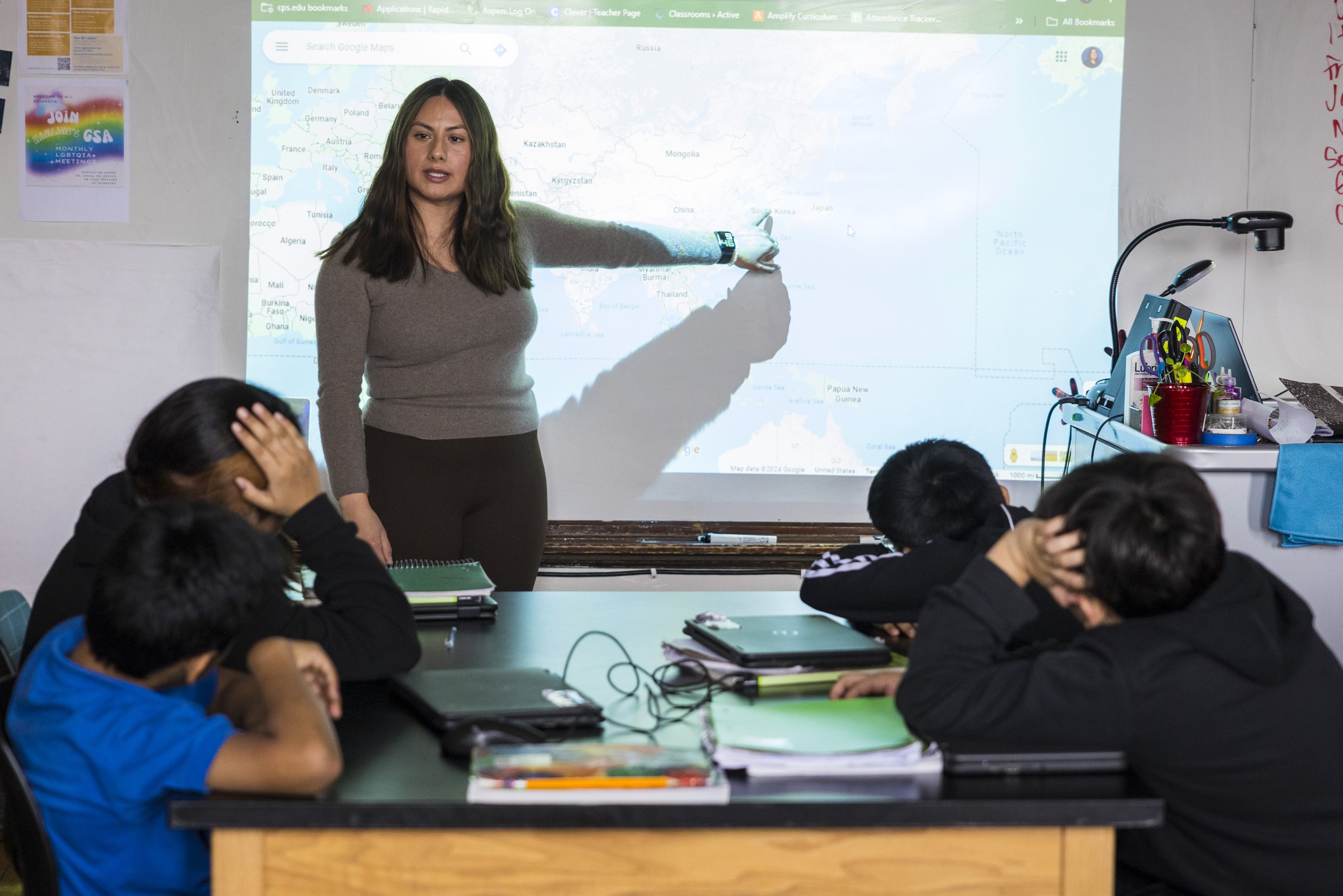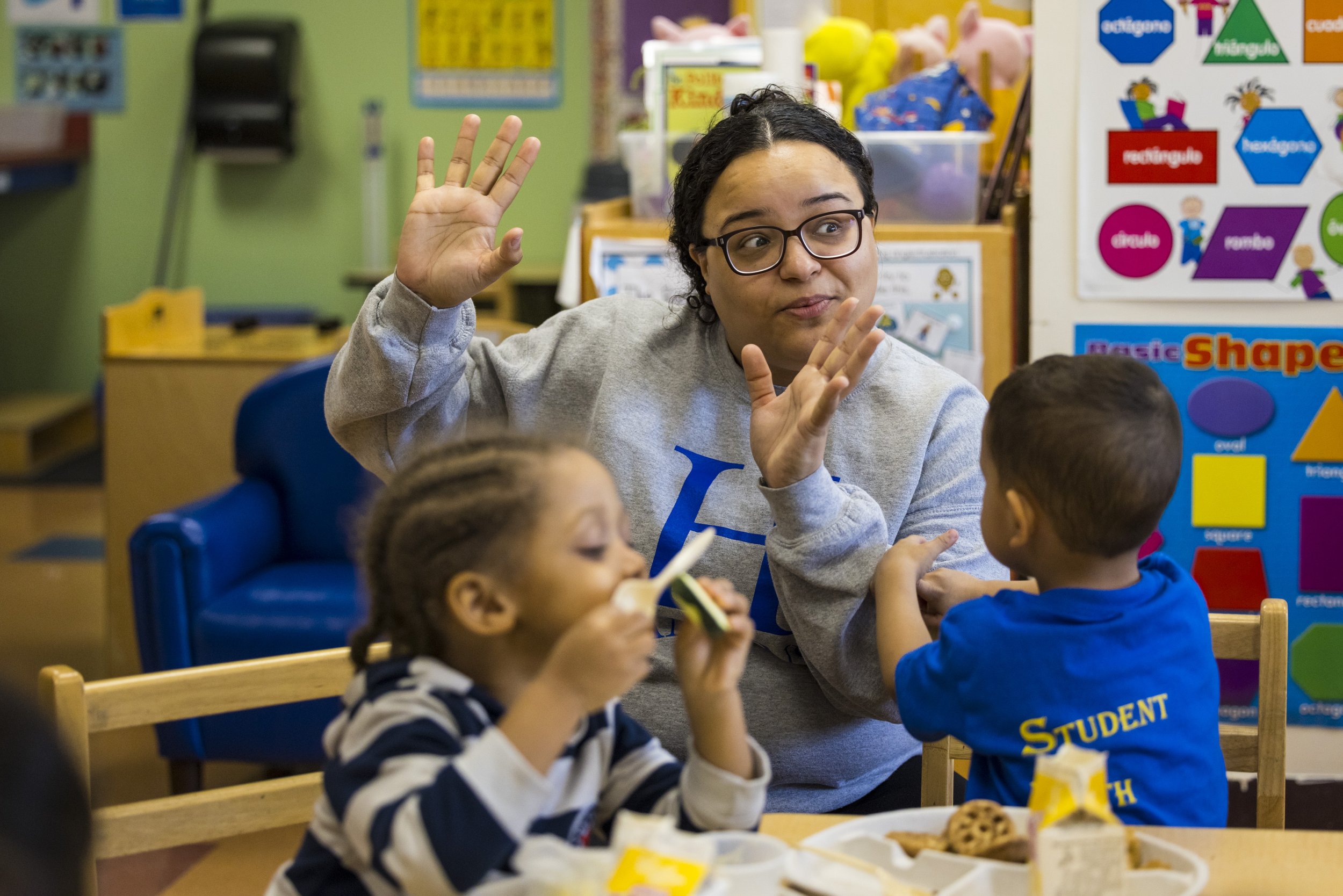Welcome Home
Jessica Sullivan-Wilson, Managing Director of Partnerships
Research shows over and over again that students who have a teacher or principal who looks like them and shares a similar background have more academic success and better attendance. This is why half of our corps members are from Illinois and teaching in Illinois and more than half identify as someone of color. We spoke with Jessica Sullivan-Wilson, managing director of partnerships, about our homegrown recruitment efforts and what our incoming corps members a can expect over the coming months. Jessica does three things; She works with our school partners where we place our corps members, she manages our graduate school partnership with National Louis University, and she oversees some localized recruitment strategies to help our recruitment team find amazing homegrown talent and the best opportunities are for us to engage with them.
If you would like to attend our Homegrown Happy Hour on April 17, please RSVP by clocking the button below.
Teach For America:
What is your approach to recruiting homegrown talent?
Jessica:
One of the ways that we recruit homegrown talent is by starting in our own backyard. Our school partners (where we place corps members) know us and have faith in Teach For America and see something in the staff in their building who they want to grow into teachers. I think that's one avenue. I think the institutions that are in our region like Northwestern University, Chicago State, National Louis, University of Illinois-Chicago, and others are prime partners for recruitment. Many times these folks are folks who have grown up in Chicago, in Northwest Indiana, and across Illinois and we are inviting them to come invest, still be a part of our community, and have an impact to be a reflection of what they needed in the classroom. That is why I chose this job for myself because I got to serve not only the city of Chicago, which has become home for me but also in my hometown of Gary, Indiana. I want to continue bringing talent to the students in my hometown whose residents I sit in church with every Sunday.
TFA:
So you are also homegrown talent?
Jessica:
I am!
TFA:
Why is it so important that students have teachers who share a similar background?
Jessica:
It lets you see what you can become. It helps you to know that there is something for you on the other side of the high school experience. Especially for a lot of our Black students, teaching is not often the first thing that comes to mind. On one hand that's great because we want them to know there is a world of opportunity for them. But we also want them to recognize a potential career in teaching. We need amazing Black educators and educators of color in front of our students because research shows over and over again that for students who have a teacher or principal who looks like them, it results in academic success, their attendance improves, and discipline referrals decrease.
“If I know my teacher is invested in my neighborhood, I know they are invested in me.”
So it’s important to be able to recruit not only homegrown talent, but homegrown talent of color from the neighborhoods these teachers grew up in. We want teachers who know about the candy lady on the corner, who know the best places to eat, and who know all the great ditching spots so they can't be played! But seriously, it is amazing to have that shared experience with your students because it builds relationships and that builds trust. If I don't trust my teacher, I am not going to have the best learning and experience because I'm going to be afraid to ask for help or share my dreams. If I know my teacher is invested in my neighborhood I know they are invested in me. We want to continue to grow the next generation of homegrown talent who will invest in their neighborhoods and their students.
TFA:
I’m so interested in your commitment to finding people who will commit to a school or a neighborhood or even a career path for the long haul. Besides recruiting and cultivating homegrown talent, what are some others ways you work with people who are committed to the places from which they started?
Jessica:
We love hearing about and helping corps members and alumni who choose to stay at their placement school for more than the required two years and alumni who stay in the region or work at our partner schools. Hamline in the Back of the Yards neighborhood is a really good example of this. The principal is Natasha Ortega (‘09 Greater Chicago–Northwest Indiana) and we have several corps members and alumni who are in that school doing the collective work to help this school community actualize their goals. Between our continued investment of placing corps members there year after year and folks who stay long after their placement, we are all showing a continued commitment to our neighborhoods and school communities.
Natasha Ortega (‘09 Greater Chicago–Northwest Indiana), Principal at Hamline Elementary
TFA:
There are so many ways we can cultivate a lifelong commitment to education equity. But what does it look like at the beginning? What will an incoming corps member experience that first summer before the school year begins?
Jessica:
It all starts with Launch Live, an event that happens in May. This is where you're going to meet everybody who is joining Teach For America in our region who have taken this leap of faith just like you. You're going to do some asynchronous education work as well as some live training to build community, get to know each other, and find your shared set of values.
Then comes Pre-service, which is our summer training program to help support your growth as an anti-racist educator and equip you with those foundational skills to be able to step in the classroom on the first day of school. We’ll help you set foundational skills, talk about some of the things that you'll see in the classroom, give you deeper context on our region, our students. You'll continue to learn and grow with folks who are in your cohort. Then you move to Greater Chicago or Northwest Indiana and by June 25th.
Then from June 26 through July 26, you'll be in person teaching at a local school for your student teaching experience. That's where you're going to be working alongside a master teacher who's going to be able to coach you and give you some more live, in-person, real time feedback on how to support our learners. You're going to be placed at one of our summer partner schools. If you are an elementary teacher, you could be at Piccolo School of Excellence or Horizon Southwest. If you're a high school teacher, you could be at Horizon Southwest or Intrinsic Belmont. Here you'll be working with your coaches and net master teacher. At the same time, you'll also be interviewing for your placement school for the regular school year during this time as well. So it’s a lot of things!
TFA:
What about graduate school? How does that fit into all this?
Jessica:
Your graduate school work starts off the first week in July. So you are starting summer practicum and you're starting graduate school at the same time. You only have one course you are required to take over the summer, and this course that you need to pass along with your content test, in order to be certified with your teaching license by the first day of school. After that, National Louis, our graduate school partner, sets out the cadence of your coursework throughout your time.
“Because you are with Teach For America, you have a robust ecosystem of support as an educator.”
It sounds like a lot; and it is! But you'll have a supervisor who will support you and do classroom observations. Because you are with Teach For America, you have a robust ecosystem of support as an educator. You have National Louis University, you have your Teach For America coach, and you have investments from your placement school; that could be a mentor teacher or an instructional coach, or even be the principal or the assistant principal. In addition to all of that support, you have access to Better Lesson, which includes on-demand and live coaching.
TFA:
Thank you for sharing all of this, Jessica! Is there anything else you’d like our incoming corps members to know?
Jessica:
Welcome home!








